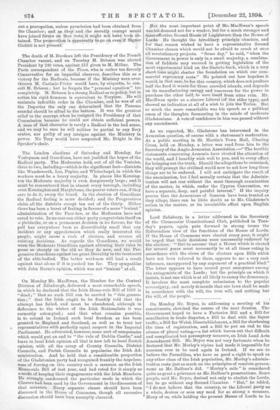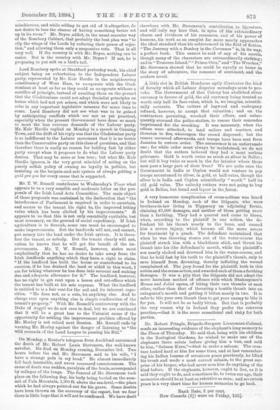On Monday Mr. Bryce, in addressing a meeting of his
constituents, sketched the course of the next Session. The Government hoped to have a Factories Bill and a Bill for conciliation in trade disputes, a Bill to deal with the liquor traffic, a Bill for Welsh Diseetablishment, a Bill for shortening the time of registration, and a Bill to put an end to the abuses of plural voting,---a list which leaves out that difficult and complicated but peremptory measure, an Irish Land Acts Amendment Bill. Mr. Bryce was not very fortunate when he declared that Mr. Morley's regime had made it impossible for coercion ever to be used again in Ireland. If we are to believe the Parnellites, who have as good a right to speak as any other class of the Irish population, Mr. Morley's adminis- tration rests just as much on the principles of resolute govern- ment as Mr. Balfour's did. "Morley's mile" is considered quite as great a grievance as Mr. Balfour's prosecutions. Some people, said Mr. Bryce, desired not only to abolish the Lords, but to go without any Second Chamber. "But," he added, "I do not believe that the country, or the Liberal party as a whole, desires or sees any need for so strong a measure, Many of us, while holding the present House of Lords to be
mischievous, and while willing to get rid of it altogether, do not desire to lose the chance of having something better set up in its room." Mr. Bryce ,added, in the uenal oracular way of the Rosebery Cabinet, that probably the best plan was "to clip the wings of the Lords by reducing their power of rejec- tion," and allowing them only a suspensive veto. That is all very well. If the country is with Mr. Bryce, nothing can be easier. But is the country with Mr. Bryce P If not, he is proposing to put salt on a bird's tail.


































 Previous page
Previous page